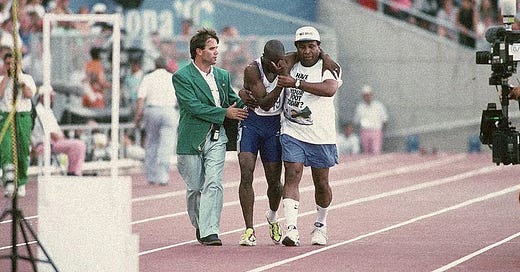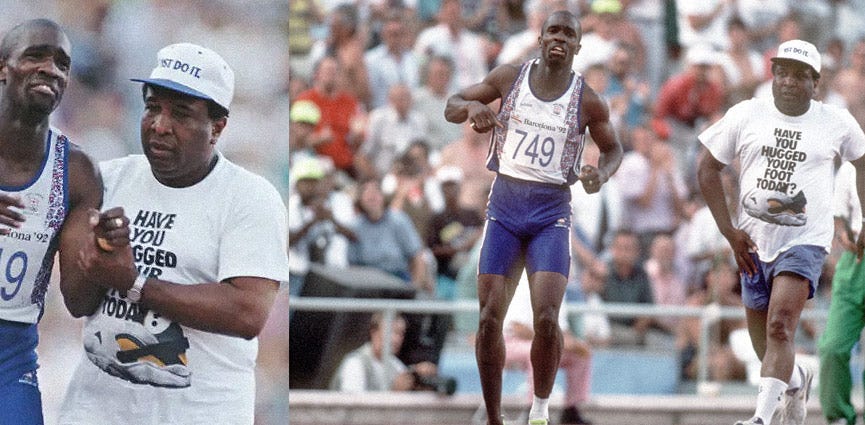Humility in a Selfish Sport: An Action Plan
Every day, the things that don’t happen, conspire with the things that do, to make our running possible. We can be better runners and friends if we notice, accept, and ask for help.
Running is a box of secrets we keep locked and hidden.
At least, that’s the way I looked at it until I quit drinking a few years ago. Now, in my honesty era, I operate with an understanding that I’m new here, don’t have all the answers, and am going to need help sometimes.
Hoarding secrets would undermine everything.
Many of us are drawn to running because of our independent natures. Ball sports and locker rooms were never a great fit. We find our joy on quietly unfolding roads, pleasure in small victories… Because they’re ours alone.
Or are they?
Here’s the thing; The rugged individualism we hold high is misguided. At best, a lone wolf outlook is limiting. At worst, white-knuckling through life alone is risky and damaging. We can be better runners, partners, and friends if we show gratitude for the support we’re given, ask for help when we need it, and notice all the ways the Universe conspires to lift us up.
It’s a simple idea, but putting it into practice is an imperfect process.
A dark, cob-webby part of my brain lights up when I’m offered encouragement or help, doubly-so when it relates to running.
Recently, I shared on Threads some training concepts I was toying with for 5 at 50. My wife said, “I saw you’ll be doing back-to-back long runs. Let me know the dates and I’ll put them on the calendar.” It was simple and sweet. I got defensive and snapped, “That was just an idea. I don’t have anything planned yet.”
Guys, this is my biggest fan and supporter. Not once, in 15 years of my borderline-obsessive running, has she spoken a negative word about it. We’ve shared heartbreak and restoration in Boston, triumph in Tacoma. She waits on race courses for kisses (sometimes at multiple stops), fixes recovery meals after Sunday long runs.
How weird that a dark, cob-webby part of my brain lights up when I’m offered encouragement or help, doubly-so when it relates to running. I’ve spent time excavating why it’s hard to open up this part of my life to others (even my closest loved ones) and simply accept the gifts.
My folks separated when I was nine. Before he left for good, my old man found an escape in running. He was gone most weekends, and the days we were together as a family were dictated by whatever race was on the calendar. Words like “thoughtless” and “selfish” swirled, and I swore never to become those things.
It’s a wonder I became a runner at all… But that’s an approval-seeking story for another day.
Perhaps you can relate to these feelings:
My running gets in the way of everyone else’s good time.
People think it’s self-centered.
Praise and offers of help are code for irritation and resentment.
When we read those statements, we know intuitively they’re not true. So, maybe there’s room for a touch more humility in our running. Let’s unpack the baggage together, starting with a couple simple acknowledgments.
Acknowledgment 1: People Are Good
I know, I know. But, flawed as we may eventually become, humans are predisposed to altruism, cooperation, and fairness. You can see this in young children (before socialization takes hold). From an evolutionary standpoint, our very survival was enabled by developing traits of bonding, resource sharing, and cooperation.
In short, we need each other. Which leads us to…
Acknowledgment 2: Nobody Really Does Anything Alone
We all love stories of self-made success. But a peek behind history’s superstars shows who lifted them to their pedestals.
Likewise, things we often take credit for were actually supported by a vast, interconnected networks of others. Think about your education: Teachers, tutors, textbook writers, the kid that let you cheat off his trig test… The web of wingmen is infinite.
This is true for every aspect of our lives. Even our supposedly self-constructed inner worlds owe a great deal to the people who have influenced our experience of life.
Acknowledgement 3: 1 + 2 = Trust
If we believe that, 1) People are good, and 2) We don’t really do anything alone, then we’re led to a singular conclusion: We have to trust others with the things we hold dear. We must assume positive intent, loosen our grip, and let people in. The alternative is to fight nature, to be the wolf going it alone in a never-ending winter.
Humility, as I think of it, isn’t a denial of our specialness. As a childhood resident of Mr. Rogers’ neighborhood, that wouldn’t sit right with me. It’s more an acceptance of how little we know, and how much room we have to grow. Then comes the tricky part, which I’m working out in real time through the words you’re reading; an admission that we can grow even better with some help.
So, what do you think? Like me, can you see space for humility in your running?
Straight from my sobriety playbook, I offer three actions we can take to create change. This isn’t a “sequence” and they aren’t one-and-done activities. If we want meaningful, sustainable growth, we need to integrate these actions into every aspect of our lives (running and otherwise), interweaving them through our days.
Action 1 (Basic Level): Notice
We’re all pretty much experts at tuning out. Maybe it’s self defense; a force field against the constant onslaught of sensory inputs. The highly-sensitive among us are especially adept at self-isolation and distraction from, err… Distractions.
To make room for others in our running, it’s helpful to notice the ways they’re already there. This can mean tuning in to a new frequency, one that runs underneath the noise of the everyday. A practical (if unconventional) way is to notice the absence of things.
“Absence is the highest form of presence.”
~James Joyce
Think, “What didn’t get in the way of my run today?”
Paying attention to the empty spaces can help us see the fullness of our privilege: The kind word here, the offer of support there, the removal of a barrier, the flexible schedule. Every day, the things that don’t happen, conspire with the things that do, to make our running possible.
Take note. Be grateful.
Action 2 (Intermediate Level): Accept
The unspoken code of the bootstrapping individualist says, “Accepting help screws up the story. MY story.” Let’s draw out this metaphor. Stories that feature only one character are rare, and tend to talk more about spirals into mental decline than ascents to greatness.
More often, a protagonist initially rises on his own terms, then struggles, sinks, and is finally lifted from the depths by a hand that was there all along (“Good Will Hunting”). Or, he repeatedly swats the hand and continues to fall (“Wolf of Wall Street”).
As we become more skilled at noticing them, wouldn’t we be fools—knowing how the stories always end—to reject the hands that reach out to us?
Forget what you’ve been told. There’s no debt to be repaid afterward. We can simply receive kindness, and quietly (or loudly, if that’s your style) thank the giver.
Action 3 (Ninja Level): Ask
On the path to sobriety, here’s one I rejected a thousand times; If you’ve tried and failed, you can ask for help. If you simply want to see what’s possible, you can ask for help. If you’ve received help, but need more, or a different kind, you can ask again.
I know, it makes us vulnerable and exposed. It’s scary.
Rather than waiting until we need help, we’re out front, setting the course with intention.
Here’s a mindset shift; What if you see it as a power grab? When we proactively say, “I could use a hand,” we’re taking charge of the narrative. Rather than waiting until we need help (or waiting too long, beyond the point of no return), we’re out front, setting the course with intention.
A simple running analogy to remember is: You can rest when you choose, or rest when you get injured. Pick one.
The Finish Line
As I headed out for a run yesterday—after having written most of this article—my wife said she hoped I had fun on the trails. She was still working, so my instant read was, “jealousy.” I interrupted an actual response, but the knee-jerk reaction was there.
Biggest fan, biggest supporter. Old baggage persists.
The point is, this work of acknowledging how little we know, accepting the support we need, and even asking for help (gasp!), is never done. But, it’s the good work.
When we make a habit of seeing and being grateful for generosity, we open ourselves to new levels of joy. Our brains reconfigure, scanning the environment not for threats, but for kindness. We become more attuned to the help that’s all around us, which puts us on the path to becoming better helpers ourselves.
That’s when the ultimate payoff reveals itself; the ability to pay the goodness forward.
Running Lightly is one of the ways I’m bringing my box of running secrets out of the shadows. If the reads are resonating, please consider subscribing.
About the Main Image
In the semifinal 400-meter race of the 1992 Barcelona Olympics, British runner Derek Redmond tore his hamstring. In spite of the intense pain, Redmond insisted on finishing. As he limped along, his father rushed onto the track to support him, helping Redmond to the line.











So beautiful. So many bits of wisdom I want to pull out and place on my thought wall, but I fear it would turn into wallpaper by the end. Forever thankful that you invite me into your running, and your life.
This is eerily accurate for me. I'm beginning to grasp the academic aspects of these topics but I'm lagging on putting it into practice! I'm also fortunate to have a supportive, encouraging partner. Which I find suspicious at times... 😂